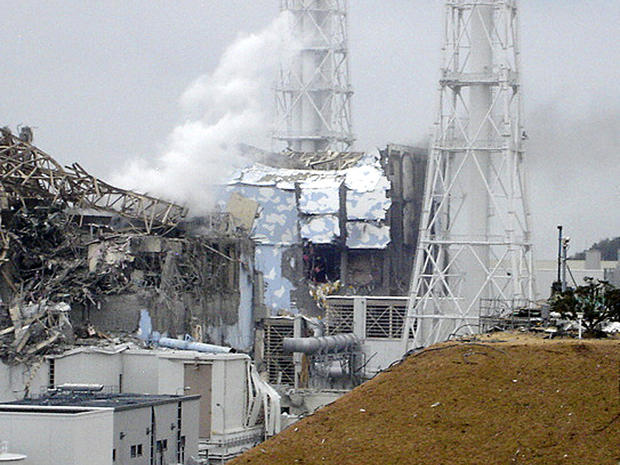Panic, confusion over Japan plant evacuation
Megan Towey is a CBS News producer based in Miami, currently on assignment in Japan.
At 1:45 p.m. Japan time, or 12:45 a.m. Eastern, if you prefer, all hell broke loose.
Reports started coming in that 50 nuclear plant workers -- the last line of defense against a possible meltdown at the Fukushima Dai-ichi power plant - had suspended operations and evacuated the plant.
I was sitting in the office of the CBS News bureau in Tokyo, working on Harry Smith's story for "The Early Show", when the news broke.
The first question that came to my mind: What does this mean? If the workers had left and weren't being replaced, the fuel rods would increasingly become hotter and hotter until they exploded. If there was a nuclear meltdown, would it reach Tokyo?
Complete coverage: Disaster in Japan
Radiation reality check: Risks and fears
The Fukushima 50: Not afraid to die
Weather reports seemed to indicate that over the next few days the wind direction would, indeed, shift towards the sprawling capital city. Not to be overly dramatic, but these are thoughts that race through your mind at a time like this. Do I work on the story for the morning show, or is it time to get the hell out of dodge?
CBS Radio News reporter Lucy Craft got on the phone and started calling the Tokyo Electric Power Company, which runs the Dai-ichi plant, to find some information.
But given that the Tokyo bureau is relatively small, Marsha Cooke, the Tokyo Bureau Chief, and I asked New York to help out making other calls.
I was on the phone with New York asking our infinitely helpful foreign desk to please get someone who speaks Japanese on the line with the Prime Minister of Japan, the Chief Cabinet Secretary, the Nuclear and Industrial Safety Agency... basically, anyone who could tell us why the workers were evacuated, would they be back, or was someone else stepping in to take over the containment mission?
At this time, the desk informed me that a nuclear expert had told them that if the plant was unmanned for 24 hours, with no efforts made to cool the fuel rods, things would get very, very bad. Chernobyl came to mind.
This little tidbit was just starting to sink in when, all of a sudden, an alarm started going off in our bureau and a woman came over the loudspeaker in Japanese. Then the building started shaking. We were having another aftershock.
I know it probably sounds like I am making this up -- surely that many scares couldn't be happening all at once. But it's all 100% true. It was a surreal moment.
Then Rei Hayashi, a Japanese speaker who works on our foreign desk, started translating the alarm for me; We were experiencing an aftershock. The elevator would be shut down for the duration of the quake. Talk about sensory overload!
Once the building stopped quaking, we got back down to work. There was a lot to talk about; Should our crews start moving south, should we leave the country, were there nuclear fallout shelters in Japan? And in the midst of all this, Marsha was also trying to figure out a way to get gasoline to a CBS crew that was about to run out of gas outside Tokyo and would soon be left stranded. For about half an hour, we frantically tried to figure out what was happening.
Then, all at once, the good news started coming in. New reports that the workers were back in the plant, and Lucy finally got through to the Tokyo Electric Power Company. They told her the workers were back on the job. They said the workers had, in fact, never left.
A company representative said that earlier in the morning, when radiation emissions went up around the plant, workers outside were ordered to come into a building inside the plant complex and halt their work. Then, once emissions dropped about an hour later, the workers returned to their posts.
Crisis averted, for now anyway. One thing is certain, it was one hell of an afternoon.
